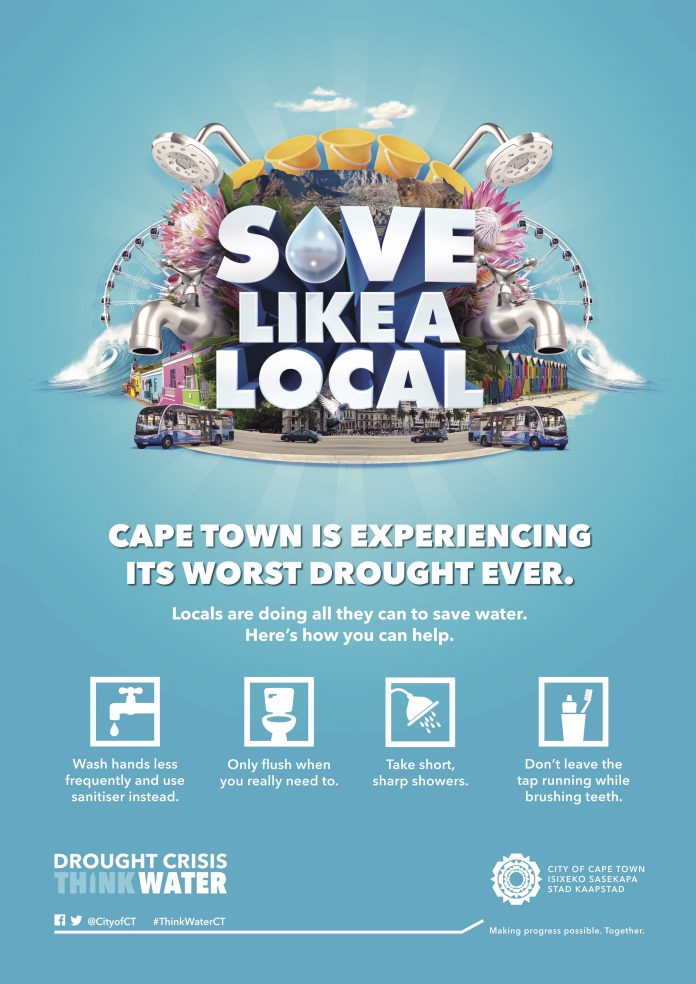By Tali Feinberg
As the worst drought in recorded history grips the Cape, “We need all visitors to save water like a local,” wrote Atlantic Seaboard City Councillor Shayne Ramsey on Facebook.
When tourists enter the Cape, they will be asked to use just 87 litres of water per person per day, and they can expect buckets in showers, bath plugs removed, pools covered and a set of water-restricting rules presented on arrival, depending where they stay.
“The city will rely heavily on the tourism sector to spread awareness that Cape Town is a water-scarce region. The ‘New Normal’ requires us to adapt the way that we have been doing things, in all aspects of our lives,” Ramsey wrote.
She also advised that water supplied by the City remains safe to drink and is tested in accordance with safety standards.
However, the City has now entered Phase One of its Disaster Management Plan, which includes water rationing and ‘water-shedding’. The City has advised that each household should store up to five litres of water for essential usage in the event of intermittent supply.
In a recent statement, Mayor Patricia De Lille said that “We’re determined that we’ll not allow a well-run city to run out of water,” and that desalinisation will be up and running by February 2018.
In terms of maintaining Jewish life while in the city, Rebbetzin Esther Maizels assures visitors that the mikveh in Sea Point will remain operational. “The mikveh has sufficient rain water now, and the rain water is stored — so there is no problem with the mikveh in a drought situation.”
Easy ways to ‘save water like a local’
Do not use the bath unless in exceptional circumstances, such as bathing a baby or for someone with disabilities. Most hospitality establishments will have removed bath plugs. If you do have to run a bath, save this water for flushing toilets, washing floors or add hot water to it the next time you bath.
Do not leave a tap running while brushing your teeth, and wash hands as quickly as possible.
Shower once a day or even every other day, for two minutes. Place a bucket to capture the water and use this to flush toilets.
‘If its yellow, let it mellow. If it’s brown, flush it down’ (with grey water from your shower!)
Use wet wipes, waterless hand sanitisers and dry shampoo to cut down on showers.
Speak to your hosts about saving water and what they expect from you. Request buckets to save water if they are not provided.
Keep the cover over the pool when you are not using it, and do not refill pools with drinking water.
The use of baby splash pools is prohibited.
Washing of cars is prohibited.
Only do laundry when you have a full load.
Wash dishes with minimal water by hand, or only use your dishwasher when it has a full load.
Use mugs, cups and plates a few times before washing them.
If you have water at the end of the day in a water bottle, do not throw this out – pour it into the kettle or a glass, or use it for cooking.
Do not water any grass or plants unless it is with grey water.
Do not use hose pipes for any reason.
Do not use sprinklers or drip irrigation.
Ensure that everyone has adequate drinking water, including pets.
If at a restaurant, request water by the glass instead of a jug, which could go to waste.
Children love playing with water, but it is important to explain that water is precious and they can be a ‘water warrior’ by not wasting water while playing or drinking.
If you are going to a public swimming pool or water park, find out ahead if it is open during the drought.
Swim in the sea rather than the swimming pool at home or the hotel.
Take note that water you use at the gym, public restrooms, outdoor showers and at other homes or venues all count towards your 87 litres per day.
Go to https://mycapetownneeds.co.za/thinkwater/ to calculate your water usage and find out if you are meeting your 87l per day target.











